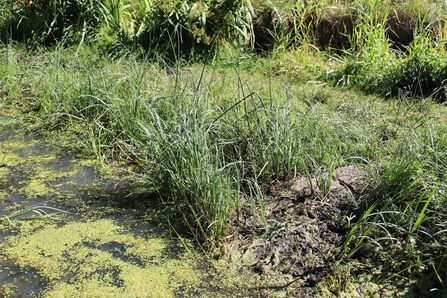
Dried out pond (home to frogs and dragonflies) at St Nicholas Park nature reserve in Newcastle. Image by Richard Clark.

Dried out pond (home to frogs and dragonflies) at St Nicholas Park nature reserve in Newcastle. Image by Richard Clark.
The driest weeks for parts of England since 1935 have left nature under pressure with wildfires devastating landscapes, habitats left parched, and wildlife endangered by concentrated levels of pollutants in low-flowing rivers.
The Wildlife Trusts are extremely concerned about the impacts on natural areas - in particular, on rivers, wetlands, and streams - and are calling on the Government to introduce a suite of measures:
Mike Pratt, Northumberland Wildlife Trust Chief Executive says:
“Nature is really struggling with extreme weather, and we need to act now to ensure our parched landscapes and rivers - the natural environment that provides us with food and water - are more resilient in the future. It is critical to create more space for nature to keep land from drying out and give support to landowners for projects, such as beaver releases, that help ecosystems to recover.
“Water bosses should unite and impose a country-wide hosepipe ban to reduce non-essential use and avoid the worst impacts of drought on rivers and wildlife, rather than relying on more damaging measures later. Water companies must also invest in water storage infrastructure, tackle leaks, and improve water efficiency - it’s a scandal that so much water is wasted every day. Government must ensure that new homes are water-efficient and bring in universal water metering to help all customers limit their water use.”
Vast quantities of water are used and leaked every day
The Wildlife Trusts believe more action is needed to tackle leaks, and that water companies should help businesses and householders to waste less. Water companies should also improve capacity to store water when it is plentiful so that less is extracted from rivers - particularly in times of drought when nature needs it most.
No rain makes a bad situation worse for wildlife
The Wildlife Trusts have reported on the impacts of drought, wildfires and extreme temperatures on nature reserves and wildlife across the UK. They include:
Soil invertebrates and detritivores that recycle organic matter are being driven deeper into the soil, which can contribute to soil erosion in exposed places.